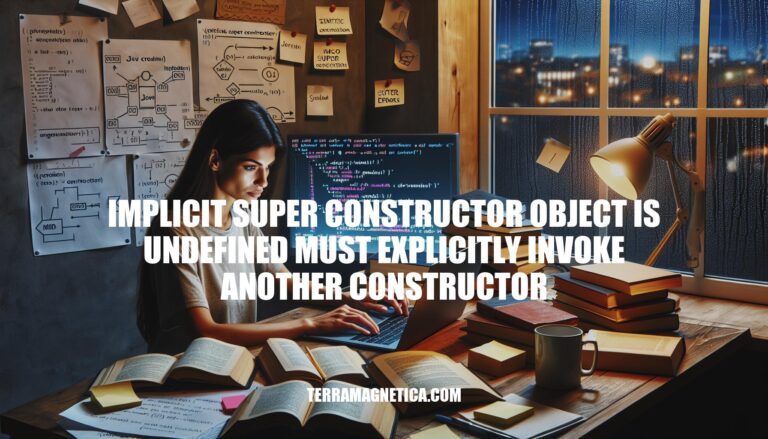


In Java, the error “implicit super constructor is undefined must explicitly invoke another constructor” occurs when a subclass does not explicitly call a constructor of its superclass. This is crucial because the superclass constructor initializes the inherited fields and methods. If the superclass lacks a no-argument constructor, the subclass must explicitly call a specific constructor using super(parameters). This ensures proper initialization and avoids runtime errors, highlighting the importance of constructor chaining in object-oriented programming.
An implicit super constructor is a default constructor that Java automatically calls for a superclass when a subclass is instantiated. If a subclass does not explicitly call a superclass constructor, Java tries to call the no-argument constructor of the superclass by default.
super(parameters).The error “implicit super constructor object is undefined must explicitly invoke another constructor” typically occurs in the following situations:
When a subclass constructor does not explicitly call a superclass constructor, and the superclass does not have a no-argument constructor.
Example:
class SuperClass {
public SuperClass(String message) {
System.out.println(message);
}
}
class SubClass extends SuperClass {
public SubClass() {
// Implicit call to super() here, but SuperClass does not have a no-argument constructor
}
}
Solution:
class SubClass extends SuperClass {
public SubClass() {
super("Hello from SubClass");
}
}
When the superclass has only parameterized constructors and no default (no-argument) constructor.
Example:
class SuperClass {
public SuperClass(int number) {
System.out.println(number);
}
}
class SubClass extends SuperClass {
public SubClass() {
// Implicit call to super() here, but SuperClass does not have a no-argument constructor
}
}
Solution:
class SubClass extends SuperClass {
public SubClass() {
super(42);
}
}
When an abstract superclass does not have a default constructor, and the subclass does not call a parameterized constructor of the superclass.
Example:
abstract class AbstractSuperClass {
public AbstractSuperClass(String name) {
System.out.println(name);
}
}
class ConcreteSubClass extends AbstractSuperClass {
public ConcreteSubClass() {
// Implicit call to super() here, but AbstractSuperClass does not have a no-argument constructor
}
}
Solution:
class ConcreteSubClass extends AbstractSuperClass {
public ConcreteSubClass() {
super("ConcreteSubClass");
}
}
When there are multiple levels of inheritance, and intermediate classes do not have default constructors.
Example:
class BaseClass {
public BaseClass(String base) {
System.out.println(base);
}
}
class IntermediateClass extends BaseClass {
public IntermediateClass(String intermediate) {
super(intermediate);
}
}
class FinalClass extends IntermediateClass {
public FinalClass() {
// Implicit call to super() here, but IntermediateClass does not have a no-argument constructor
}
}
Solution:
class FinalClass extends IntermediateClass {
public FinalClass() {
super("IntermediateClass");
}
}
These examples illustrate common scenarios where this error occurs and how to resolve it by explicitly invoking the appropriate superclass constructor.
Here are the step-by-step instructions to resolve the implicit super constructor object is undefined must explicitly invoke another constructor error:
Ensure you know which class is the superclass and which is the subclass.
// Superclass
public class SuperClass {
public SuperClass(String param) {
// Constructor with parameters
}
}
// Subclass
public class SubClass extends SuperClass {
public SubClass() {
// Constructor
}
}
Explicitly call the superclass constructor using super() with the appropriate parameters.
// Subclass with explicit call to superclass constructor
public class SubClass extends SuperClass {
public SubClass(String param) {
super(param); // Call to superclass constructor
}
}
Make sure the parameters in the super() call match those in the superclass constructor.
// Superclass
public class SuperClass {
public SuperClass(String param) {
// Constructor with parameters
}
}
// Subclass
public class SubClass extends SuperClass {
public SubClass(String param) {
super(param); // Correctly matches the superclass constructor
}
}
Compile and run your code to ensure the error is resolved.
javac SubClass.java
java SubClass
By following these steps, you should be able to resolve the error.
To avoid the “implicit super constructor object is undefined must explicitly invoke another constructor” error, follow these best practices:
Always Define a No-Argument Constructor in the Superclass: If your superclass doesn’t have a no-argument constructor, explicitly define one. This ensures that subclasses can call it without issues.
public class SuperClass {
public SuperClass() {
// Initialization code
}
}
Explicitly Call the Superclass Constructor: In your subclass, always call the appropriate superclass constructor using super(). This is crucial for proper constructor chaining.
public class SubClass extends SuperClass {
public SubClass() {
super(); // Calls the no-argument constructor of SuperClass
// Initialization code
}
}
Match Constructor Parameters: Ensure that the parameters in the super() call match those of the superclass constructor.
public class SuperClass {
public SuperClass(String param) {
// Initialization code
}
}
public class SubClass extends SuperClass {
public SubClass(String param) {
super(param); // Calls the parameterized constructor of SuperClass
// Initialization code
}
}
Avoid Overloading Without Default Constructors: If you overload constructors in the superclass, always provide a default constructor to avoid implicit constructor issues.
public class SuperClass {
public SuperClass() {
// Default constructor
}
public SuperClass(String param) {
// Overloaded constructor
}
}
Use @Override Annotation: This helps catch errors at compile time by ensuring that you are correctly overriding methods, including constructors.
@Override
public SubClass() {
super();
// Initialization code
}
Proper constructor chaining is essential because it ensures that the superclass is correctly initialized before the subclass, maintaining the integrity of the object hierarchy and preventing runtime errors.
Happy coding!
Follow these best practices:
Proper constructor chaining is crucial for maintaining the integrity of the object hierarchy and preventing runtime errors. By following these guidelines, you can write robust and well-structured code that avoids common pitfalls associated with implicit super constructor issues.